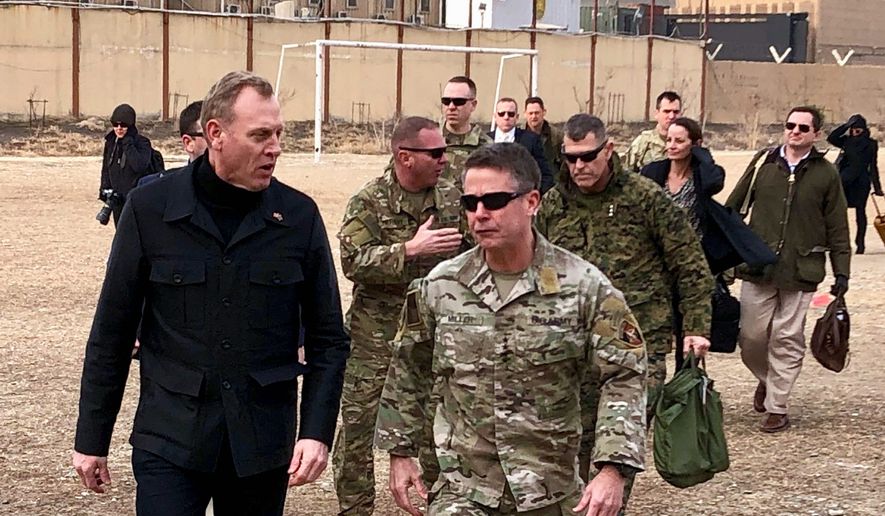With an Afghanistan peace deal seemingly within reach, Acting Defense Secretary Patrick Shanahan made a surprise trip to the country Monday to visit U.S. troops and meet with top government officials in Kabul, his first trip abroad since taking over the Pentagon’s top job last month.
But Mr. Shanahan said he carried no orders from President Trump to begin drawing down the 14,000 American forces deployed there, which remains a key point in ongoing talks with the Taliban.
The trip marked the first time Mr. Shanahan, a former Boeing executive who took over as acting Defense secretary following the resignation of James N. Mattis, has ever been to Afghanistan. He told reporters traveling aboard his plane that he’s encouraged Mr. Trump is searching for ways to end the conflict in Afghanistan, where U.S. troops have been fighting since the immediate aftermath of the Sept. 11, 2001, terrorist attacks.
His trip comes at a pivotal moment for the future of Afghanistan, where the central government has struggled to maintain control over much of the country amid a resurgence by the Taliban and other radical Islamist forces, a resurgence that’s included direct assaults on American personnel. New U.S. envoy Zalmay Khalilzad recently held a series of meetings with Taliban officials in Qatar, and while both sides came out optimistic, they are still far from a sweeping cease-fire deal or a recognition by the Taliban of Afghan President Ashraf Ghani’s government.
The Taliban also is seeking assurances that American forces will soon exit the country, and have even claimed a private accord to pull American forces out by this spring.
Despite reports that Mr. Trump plans to soon order a drawdown of at least half of the 14,000 U.S. troops in Afghanistan, Mr. Shanahan said he’s received no such order, and he offered no clarity on when the troops will begin coming home.
SEE ALSO: Patrick Shanahan, acting defense chief, makes surprise visit to Afghanistan
He did, however, try to downplay the U.S. role in Afghanistan’s future.
“The Afghans have to decide what Afghanistan looks like,” Mr. Shanahan said. “It’s not about the U.S., it’s about Afghanistan.”
While the administration seems to be moving toward a military drawdown in Afghanistan, officials still cast the American role there as critical to U.S. national security.
“Great to have [Secretary Shanahan] here visiting with the service members — these men and women are fighting to protect America; denying safe haven to terrorists across Afghanistan,” U.S. Forces-Afghanistan spokesman Col. Dave Butler tweeted Monday.
After meeting with Mr. Ghani and other government officials in Kabul, Mr. Shanahan met with Afghan commandos who have been trained by American forces and have played a leading role in recent U.S.-backed military offensives against the Taliban.
Following the Afghanistan stop, Mr. Shanahan will travel to Brussels for a meeting with his NATO counterparts — his first appearance on the world stage since taking over at the Pentagon.
Even as Mr. Shanahan was in the country, Mr. Ghani on Monday rejected the Taliban-backed idea of an interim government in Kabul. He stressed that Afghan elections will go forward this summer as scheduled.
Even though Taliban leaders have steadfastly refused to meet directly with his government, Mr. Ghani said Monday the nation should hold a loya jirga — the traditional gathering of Afghan political and tribal leaders — to reach a lasting peace deal.
Mr. Trump has made clear that he intends to fulfill key campaign promises and begin bringing U.S. forces home. Having already begun a withdrawal from Syria, where forces had been battling the Islamic State, the president last week used his State of the Union address to decry the “endless wars” that he said have been a staple of American foreign policy for the past two decades.
But that approach has drawn fire from lawmakers, including many in his own part, who argue that the U.S. could create a power vacuum that allows the Taliban to regain control over much of Afghanistan. Islamic State has also established a presence in the country even as its base in Syria and Iraq has been virtually wiped out by the U.S. and its allies.
Regional analysts say the administration should proceed cautiously and look to history as a guide, pointing out that the Taliban also had promised to share power with the government in Kabul in the late 1990s before ultimately seizing total control and allowing al Qaeda to use the country as a base of operations.
“The Taliban lied then, and there is no evidence that the group’s assurances are any more meaningful now, especially as the Taliban and the United States do not accept a common definition of terrorism,” Michael Rubin, a Middle East scholar at the American Enterprise Institute, wrote in a piece Monday for The National Interest.
“If the United States departs, then it is likely that the Taliban will consolidate control over the majority of Afghanistan,” he said. “The United States appears willing to leave Kabul high and dry; it is unlikely that outside powers will provide the Afghan government with the billions of dollars the World Bank says it needs to stay afloat. The Taliban, meanwhile, can rely on Pakistani support.”
• This story is based in part on wire service reports.
• Ben Wolfgang can be reached at bwolfgang@washingtontimes.com.




Please read our comment policy before commenting.